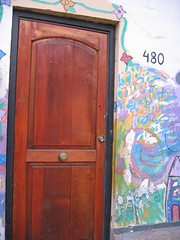Sagrada Familia
16 May 2006
4:30 PM
This is the second article in the Work Week series.
Tuesday afternoon at 4:30pm, I ring the doorbell at Sagrada Familia, one of three houses in the Divina Providencia hogar network. As I wait for the door to open, I appreciate a few last quiet moments on the outside. Then the door opens and I’m in. And my time at the hogar begins.
Hogar means home in Spanish. One company’s slogan is “Da vida a tu hogar,” which roughly means, “Give your home some life.” Hogar is also the word used for the other types of homes. In Bolivia, I volunteered sporadically at an hogar, Salomón Klein. For that place, hogar would most likely be translated as orphanage. It received abandoned children that parents left on its doorstep or that authorities found throughout the city. In contrast, my current hogar is more like a group foster home; all of the girls currently living there have known parents.
Girls arrive at Divina Providencia almost exclusively through interventions. In each girl’s case, someone alerted authorities about a potentially abusive situation and the girl was removed from her home. The most common problem is physical or sexual abuse. Once a girl is living in the hogar, social workers work with the family and the daughter to change the situation with the aim of returning the child eventually. The stated government goal is to effect these changes within six months to a year. The resident psychologist at Divina Providencia told me this almost never happens. Returning home may take a few years, several years, or never happen at all. These temporary foster homes become, by and large, permanent homes.
Sagrada Family, where I work, has twenty girls, age eight to fourteen. The two other houses in the Divina Providencia system have girls from three- to eight-years-old and from fourteen to eighteen.
I work with one of the two foster mothers and her set of ten girls. My job is technically to help with homework and play games. But I’m told that my primary role is to offer the girls exposure to a man—there aren’t many in their lives—and one who won’t hit them. For me, that part isn’t particularly hard. I’m so used to being male, I can do it without even trying. And I don’t need the stipulation about not hitting the girls; I’m not inclined to that anyway.
Typically, after arriving, I go around and greet all the girls. I take account of who is having a bad day and who isn’t. Next I spent a few minutes preparing the after school snack. After that, if someone needs help with homework, I sit down and work with her. Some recent assignments included drawing a map of Chile (which I am not good at) and working on multiplication tables (which I am am a master at). When no one needs help with homework, I sit with girls and invent things to do. Once I taught one girl how to draw five-pointed stars and cubes (she was fascinated). Another time I saw a girl trying to draw people, so we worked on that for the evening. I jump rope, I tickle, I give piggy-back rides.
This isn’t to say that work is all fun and games. Many times, seeing the system in action infuriates me. One night I helped one girl with math homework. It took us an hour to do eight problems, which consisted of two each from addition, subtraction, multiplication, and division. When I saw that she couldn’t add 3 and 1 without using her fingers, I realized that current system really doesn’t provide (or have the means to provide—I don’t know which) genuine success as an option. Getting to the next day is success enough. That’s how you get girls with long division problems who can’t even add.
If the system doesn’t get me, often the girls can do it themselves. Though I make a point in not losing my temper with them, that doesn’t mean I don’t get angry. One week a girl was throwing potatoes all over the room. I asked her why she was doing it and she replied, “Because I want to!” I asked her to stop. When that didn’t work, I stood between her and the potato box. And then she poured nail polish on my jeans (one of two pairs).
Many times I hear things in the hogar and think that a psychologist would have a field day here. “You can’t hit me, you’re not my mother!” “How was my day? Bad!” “Oh, I can hit her—she’s my sister.” The girls hit each other all the time. They beg for attention. They say nasty things to one another.
Still, it can be a joy to be there. A girl who is in a bad mood one week and be an angel the next. Many of the girls are genuinely sweet and just come from unfortunate circumstances. I keep a thick skin and generally it works. One week, Claudia came up to me and said, “You know, you’re ugly!” I made a shocked face. “Really? You think so?” I turned to another girl and asked, “is it true? Am I really ugly?” She giggled, looked at the first girl, looked at the floor, then looked at me and said, “No…I don’t think so.” Ten minutes later, Claudia ran up to me and begged for a piggy-back ride. “But you think I’m ugly!” I objected. “I didn’t really mean it,” she told me.
Even when it’s tough, I keep going back. I don’t know if I can help much—God knows I can’t teach them to draw a good map of Chile—but I may be able to teach them that you can’t keep away people who care about you.


Comments